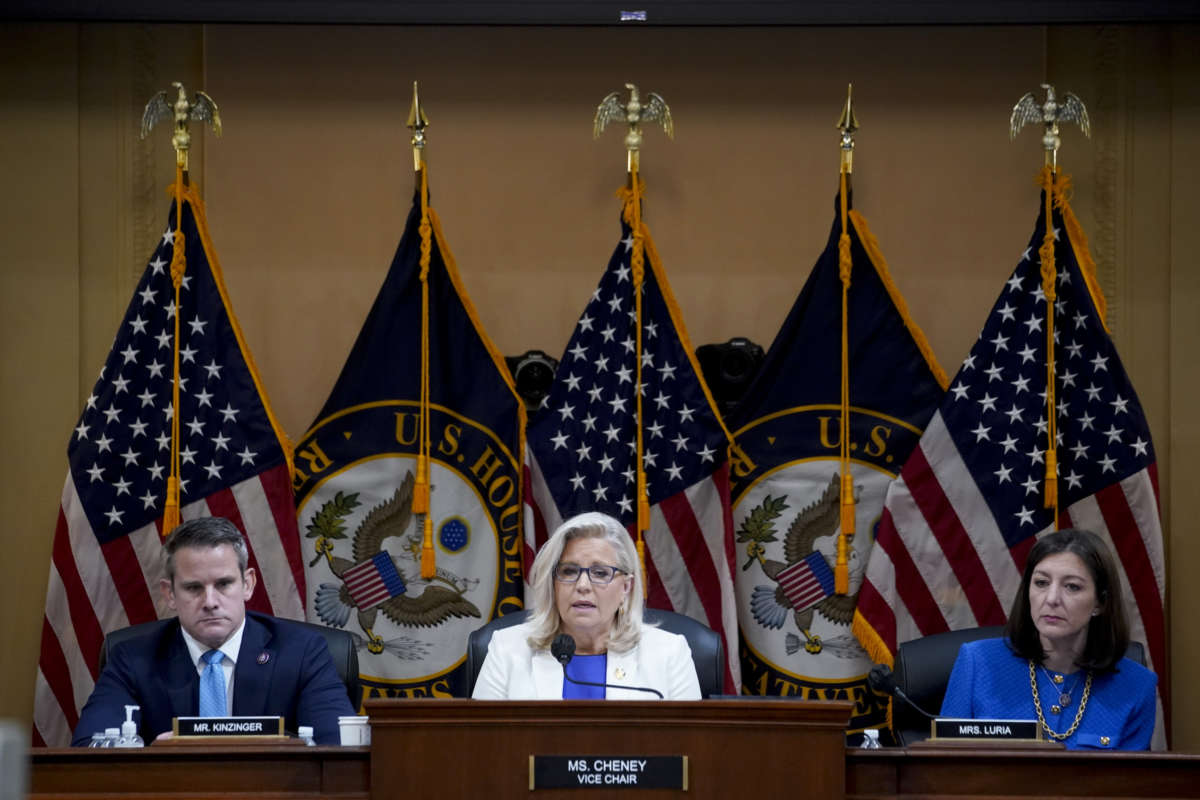Did you know that Truthout is a nonprofit and independently funded by readers like you? If you value what we do, please support our work with a donation.
In interviews over the weekend, members of the House select committee investigating the January 6 attack on the Capitol said that the ultimate decision on whether or not to prosecute former President Donald Trump for his role in the far right attack will be unanimous — and that there is enough evidence to do so.
In an interview with CNN’s Jake Tapper on Sunday, committee member Rep. Adam Schiff (D-California) said that the two Republicans and seven Democrats on the committee work with “a high degree of consensus and unanimity” and that he is personally leaning toward a referral.
“It will be certainly, I think, my recommendation, my feeling, that we should make referrals, but we will get to a decision as a committee, and we will all abide by that decision, and I will join our committee members if they feel differently,” Schiff said.
“I do agree there have been several laws broken and it is, I think, apparent that there is evidence that Donald Trump was involved in breaking several of those laws,” he continued. “When Congress does find evidence that people have broken the law, it is not always the case that it makes a referral, but in circumstances like these, I think that’s the better part of the argument.”
Rep. Liz Cheney (R-Wyoming) also said that the decision would be unanimous in an interview with the Texas Tribune over the weekend.
Cheney emphasized that Trump was actively involved in the attack. “One of the things that has surprised me the most about my work on this committee is how sophisticated the plan was that Donald Trump was involved in and oversaw every step of the way,” she said. “It was a multipart plan that he oversaw, he was involved in personally and directly.”
“In whatever action we take, we will be unanimous,” she said.
The lawmakers don’t have the power to charge Trump, but can make a criminal referral to the Department of Justice (DOJ), which would decide whether or not to act. The DOJ can also decide to prosecute Trump any time it wants, without a referral. It’s unclear if the DOJ is currently investigating Trump in relation to the attack, but it has subpoenaed documents provided to the January 6 committee, signaling that it may at least be considering an investigation.
Cheney and Schiff’s statements differ slightly from what members were saying about the referral decision this summer. Committee Chair Bennie Thompson (D-Mississippi) said in June that making such a referral is “not our job,” and that the group’s role is simply to gather and present evidence, which the DOJ can decide whether or not to use.
Committee members immediately rejected Thompson’s statement, however, saying that the group hasn’t yet made a decision on the referral and that if they did find criminal conduct — which the group has suggested they have — it would be their duty to make such a referral.
The interviews come before a public hearing scheduled by the committee for Wednesday this week, which is slated to include not-yet-revealed witness testimony and footage of the attack. This could potentially include testimony from Clarence Thomas’s wife, Ginni Thomas, whose texts show coordination with high level officials to overturn the results of the 2020 election.
The committee may also discuss a phone call made from the White House switchboard to a Capitol attacker during the assault, the existence of which was made public by a former GOP lawmaker and committee staffer on Sunday. The contents of the 9-second phone call with Trump supporter Anton Lunyk are yet unknown.
A terrifying moment. We appeal for your support.
In the last weeks, we have witnessed an authoritarian assault on communities in Minnesota and across the nation.
The need for truthful, grassroots reporting is urgent at this cataclysmic historical moment. Yet, Trump-aligned billionaires and other allies have taken over many legacy media outlets — the culmination of a decades-long campaign to place control of the narrative into the hands of the political right.
We refuse to let Trump’s blatant propaganda machine go unchecked. Untethered to corporate ownership or advertisers, Truthout remains fearless in our reporting and our determination to use journalism as a tool for justice.
But we need your help just to fund our basic expenses. Over 80 percent of Truthout’s funding comes from small individual donations from our community of readers, and over a third of our total budget is supported by recurring monthly donors.
Truthout’s fundraiser ends tonight! We have a goal to add 122 new monthly donors before midnight. Whether you can make a small monthly donation or a larger one-time gift, Truthout only works with your support.
